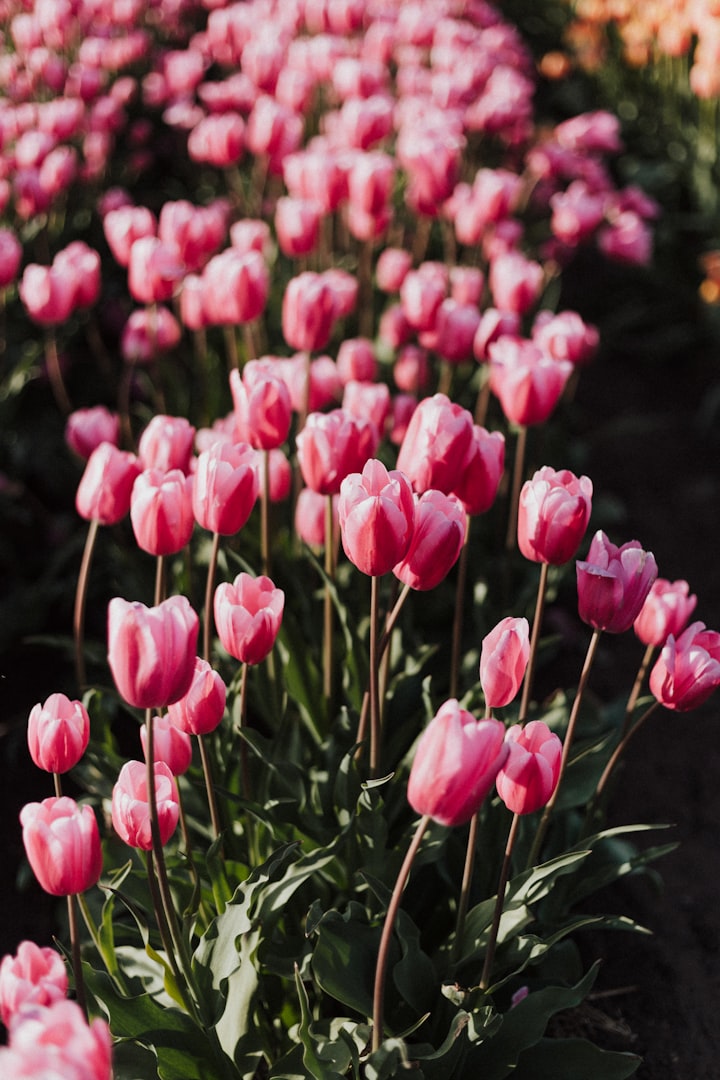Zen And The Art Of Spring Bulb Gardening
With apologies to Robert M Persig

To be mindful can be described as being fully aware and open to the world around us, to be ‘in the moment’, in a non-judgemental and ideally in a relaxed and receptive frame. This name for the concept is new; the idea itself is not new.
Meditation and Zen are words that can also describe at least part of mindfulness. Zen, meaning calm, relaxed, meditative, focused, is itself the Japanese pronunciation of an older Chinese word, ch’an. But ch’an itself is borrowed; its root is a Sanskrit word between 3,000 and 4,000 years old. The word meant thought, absorption, meditation.
So, the concept is not new, but it is certainly as relevant today as at any time in the past, perhaps more so. Automation and machines have indeed given us more time when we don’t have to be working. Still, technology has also filled those hours with more distractions and entertainment: It is as hard as ever to find time to be, to relax and tune into the here and now.
Most mornings, we wake to an alarm, or kids and pets clamouring for attention or noises outside our homes, and we find ourselves pitched, almost violently, into our day – there is a ‘let battle commence’ vibe to the thing.
Sometimes, though, there is a much more peaceful transition from sleep to wakefulness (this may only happen on holiday or on non-working/study days or days when someone else is looking after the kids). You come gradually awake. You become aware of your body and how it feels. What is the level of light in the room? Can you detect any non-intrusive sounds? Maybe you can be aware of these things even before you have opened your eyes. Perhaps you can smell flowers in the room, or maybe some kind person has brought you a cup of coffee, and you can smell that.
You gradually become more awake, open your eyes, and continue the transition to fully conscious but very aware. You are in a state of mindfulness; you are in a Zen (ch’an) state.
If you are lucky enough to be on holiday, you might follow this with some fresh fruit and a swim. If you are at home, you may not be as fortunate as this, but enjoy the time you have in this state and allow your mind to wander: It is surprising how many problems you can solve when your unconscious mind is free to work on them!
A lot of the talk about mindfulness is about achieving this state, where you are sufficiently ‘in the moment’ that you can be aware of your body and at peace with your surroundings. Most of us cannot spend our lives on holiday, and uninterrupted time to go to your happy place might be limited – you may only get 10 minutes to yourself! You need, then, to have a route that takes you to your relaxed state. It would help if you had a personal doorway that will take you to mindfulness.
This state is not always easy to explain, but sometimes an example works. Imagine there is music playing where you are, and people talking and perhaps phones ringing and other machinery noises. If you could turn down all of these extraneous noises until they faded into the background, what would you hear? You might become aware of the quiet noise of yourself breathing and the very faint sound from your pulse. Perhaps you would listen to a bird singing or the sound of rainfall or the wind moving the branches of a tree.
When you reach this point, you are becoming mindful.
Many people find that doing something else can put them in this state. This activity might be craft work – crochet, knitting, needlepoint, sewing – or paining and drawing. It might be wood carving or bread making, gardening or flower arranging.
What a lot of these pastimes have in common is some repeated activity – pushing a needle through a canvas, or kneading dough, perhaps – and as you carry out these repeated actions, your mind is freed to go elsewhere. It is not that you are not paying attention to what you are doing, it is just that the repeated nature of these actions allows headspace for you to think of something else as well.
This opportunity to be making progress on your activity and be doing something else simultaneously, to be able to think about the different things at once, is one of the joys of many crafting and creative activities.
I find I can go to this happy place when I am gardening.
I am fortunate enough to live in the South West of England, on that peninsula you see on the map that sticks out on the bottom left of the island of Great Britain. The British Isles are far enough north to get freezing winters. Still, the weather usually is milder because the islands are bathed in the Gulf Stream, the warm water current that flows from the Caribbean Sea across the Atlantic to Europe. This means that the temperatures remain more moderate than, say, New York, although they are on a similar latitude. Being on the western side of a large ocean also brings plentiful rainfall (ask Seattle and Vancouver, if you don’t believe me!), so the British Isles are green and temperate.
Britain enjoys four distinct seasons: Where I live, in the South West (which is a popular part of the country for tourists and has terrific beaches and scenery), the climate is strongly influenced by the warm Gulf Stream waters. Parts of the peninsula are even sub tropical, although we are a long way north of the tropics. Spring bulbs may flower here a whole month before they do in more northern parts of this island, even though the entire land mass is only about 800 miles from top to bottom.
Starting as early as September, I can engage myself happily in selecting and planting spring bulbs. It does not matter that it will be months before I will see the outcome of my work, the work still allows me to enter that lovely mindfull state. My tasks include weeding the ground and preparing the soil, adding mulch, scattering some feed for the earth: After that, I will select and plant the bulbs themselves, little packages of stored energy. The bulbs are waiting to receive the signals from nature that it is time to push their way out and meet the world.
Where I have bulbs already planted, like narcissi and snowdrops, the tips of the growing plants may show as early as late September, certainly by early October. Often, the bulbs seem to push a growing green tip just ½ inch clear of the soil and then they stop and wait for the right conditions to start growing in earnest.
Britian is heading into full autumn (fall) at this time of year, and the leaves are changing colour and starting to fall. Summer plants are dying back, some with a spectacular final flowering. Plants like roses will lose their leaves but still produce a final, glorious flower or two as late as November. The last of the autumn fruit is harvested (apples, mainly, and a few late-season raspberries that are perfectly coloured but very tart because they have not had enough sun to add sweetness).
The leaves fall more and more rapidly in November, and the branches become bare as the ground takes on the brown and gold and red colours. The soil is put to bed under a thick leaf duvet to keep it warm.
I will be doing little work in the soil now, although I spread mulch from my compost bins, which adds nutrients, organic matter and a protective layer to the earth. Some of my time is taken in raking leaves from the lawns and sweeping them from paths and driveways. Raking and sweeping is a marvellous activity for entering a mindful state. It’s a physical activity vigorous enough that you can feel muscles stretching and working but not so demanding as to be exhausting. It is enough, though, to warm my face and get a glow on a chilly autumn day. But it does not need my full attention. I find it easy to establish a rhythm, and then I am away, just like kneading bread or walking on a treadmill. Part of my mind handles the task, and the rest can slide through my doorway into mindfulness.
In my southwestern idyll, even before we reach the darkest part of winter and the shortest days, spring is showing its promise.
Sometimes, in winter, the frost turns the tiny tips of green bulb growth into little sparking emeralds in the winter bedding, but before you know it and still in winter, the earliest flowers advance. I often see snowdrops in this warmer part of the country in early January, sometimes even arriving by Christmas. It does not snow every winter, but often the snowdrops will be in flower before any snow falls.
Crocus follows in February, and by late February, the early narcissi and daffodils will be in flower, in a succession of blooms which will run for a few months and be joined by glorious tulips by late spring. Then the iris and alliums follow on to herald summer. It's quite a show.
Other perennial plants will be appearing by now, and part of my time is weeding. Whilst there is a lot of bending and stretching and slightly more kneeling than I might choose, this is an activity with a huge sense of satisfaction and achievement. I can easily see where I have been, with the weeds removed and clear soil showing with the nascent flowering plants and bulbs interspersed.
I also understand very clearly that every weed I take out now will save me a lot of effort later in the season, when they flower, set seed and produce dozens or hundred more weeds, if not stopped.
There are jobs for every season, but as well as being outdoors and so in the fresh air, they all also offer two things: First, there is some (reasonably gentle) exercise, some stretching and bending, some mild workout, but secondly they all engage part of my mind and set part free to do some mental gardening.
And soon enough, it is September again, and I have gone full circle. As I labour in the late summer and early autumn soil to plant more bulbs, I see not the little, dull brown bulbs I am planting but the explosions of colour on a monochrome winter day, the bright jewel-like flowers that will pop out even before the trees get their leaves and herald another spring and summer.
I am transported to my happy place.
About the Creator
Andy Killoran
British guy, recently retired so finally with time to read what I want and write when I want. Interested in almost everything, except maybe soccer and fishing. And golf. Oscar Wilde said golf ‘ruined a perfectly good walk’.






Comments
There are no comments for this story
Be the first to respond and start the conversation.